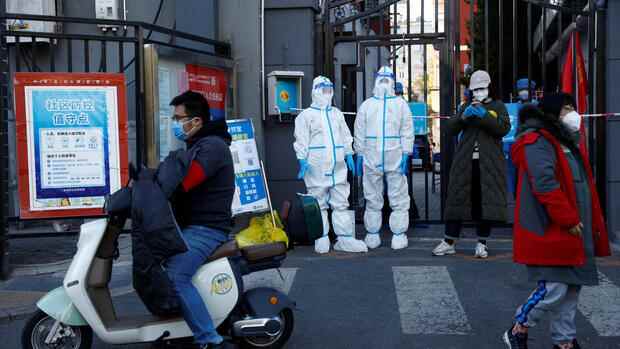Due to the strict corona restrictions, Scholz has only very limited opportunities for direct exchange with representatives from business, science, culture and civil society. In Beijing, the Chancellor and his delegation are only allowed to move within a “bubble” that is strictly sealed off from the outside world. Anyone who comes into direct contact with the group of visitors from outside must then be quarantined for seven days, locked in a hotel room.
As a result, only a few of the local Germans are willing to go into the “visitor bubble”. One of them is Jens Hildebrandt, head of the German Chamber of Commerce in China (AHK). He will go into isolation at the Diaoyutai state guest house on the eve of the Scholz visit. Hildebrandt wants to personally inform the delegation about the situation in China and the mood of the local companies. Since there are also many sensitive topics, it is better to place this in direct, even more informal discussions.
Especially after party leader Xi Jinping’s demonstration of power at the party congress in mid-October, Hildebrandt told the Handelsblatt that “ideology and security considerations will overshadow the pragmatism of the past”. Hopes of a departure from the strict zero-Covid policy were disappointed. This “lies like lead” on the growth potential of China’s economy.
Top jobs of the day
Find the best jobs now and
be notified by email.
Johann Fuhrmann, China head of the CDU-affiliated Konrad-Adenauer-Foundation (KAS), also speaks of a “great disappointment” among the population. In addition to a lack of an exit strategy with regard to the zero-Covid policy, many at the party congress also missed positive signals for the weakening Chinese economy. In particular, around 30 million unemployed young people in the cities are increasingly lacking prospects. Fuhrmann has just become a victim of the corona restrictions himself, and is currently unable to return to his place of residence in Beijing from Qingdao. He doesn’t know how long he’ll be stuck.
Concern about new lockdowns is growing
Concerns about new lockdowns are growing across the country in view of the rising corona numbers. On Wednesday, 3133 new infections were registered nationwide. But in the country with 1.4 billion inhabitants, a single case is enough to cordon off entire residential areas. In Shanghai you can really “feel how nervous people are,” reports Francis Liekens, representative of the European Chamber of Commerce in the financial metropolis.
It is unclear how much Olaf Scholz actually notices about the concerns and needs of his compatriots.
(Photo: AP)
The memory of the two-month curfew in spring continues to weigh on the 25 million residents. The experience of being trapped in your own four walls has shaken many people deeply and even prompted long-term German residents to leave Shanghai.
According to estimates by the European Chamber of Commerce in China, the number of foreigners in the People’s Republic has more than halved since the outbreak of the pandemic. China’s middle class is also discussing in countless private chat groups which country offers the best opportunities for Chinese exiles. “Run xue” (“science of running away”) is called this with gallows humor.
During his recent visit to the People’s Republic, BASF board member Markus Kamieth also experienced “a less optimistic China”. The manager, who is responsible for the Asian business at the chemical company, has already taken on the forced quarantine six times upon entry. He feels that Shanghai’s devastating lockdown and the constant risk of falling into a new Covid lockdown have also “significantly affected the confidence of many Chinese”.
In the meantime, he prefers to think twice before entering a building, says Liekens. It’s a little “like playing roulette”. Because practically everywhere you have to register with your health app at the entrance. If one of the visitors later tests positive, so-called contact persons are picked up by health workers in white body suits. They must then isolate themselves in a quarantine hotel room for up to 14 days. Many have friends or work colleagues who have had to isolate themselves again because they were in a supermarket, restaurant or Disney Land at the wrong time.
>> Read here: China trip – the economic miscalculations of the chancellor – a comment
Meanwhile, concerns about staff shortages are growing in companies. An international school in Shanghai recently asked employees to stop eating in restaurants. Even foreign companies have to ask the responsible authorities for permission when business partners or journalists come to visit. The rules for this can change from day to day.
Voices for a differentiated image of China are missing
In the art and culture scene, frustration is growing over the increasing censorship and short-term bans on events, which are justified by the pandemic situation. Fuhrmann knows that the universities, which are also suffering severely from the corona restrictions, were also hoping for a relaxation of entry restrictions in order to attract international students again. There is now a generation of sinologists in Germany who have never been able to travel to China. The interrupted exchange means that “voices for a differentiated image of China are increasingly missing,” said Fuhrmann.
It is unclear how much Olaf Scholz actually notices about the concerns and needs of his compatriots. Two virtual round tables with representatives from business and civil society are planned. But it is questionable how openly the participants connected in this way can and want to express themselves. Because in China it must be expected that digital communication will be intercepted. In view of the growing restrictions, fewer and fewer people are willing to express themselves critically anyway.
More: President Xi’s claims to omnipotence are a disaster for Europe’s companies
